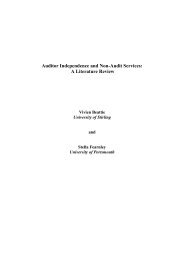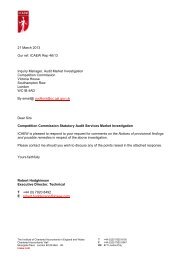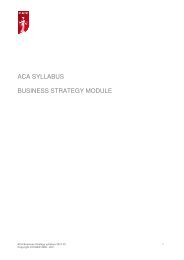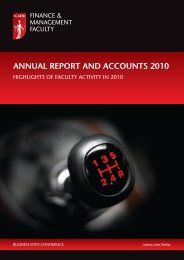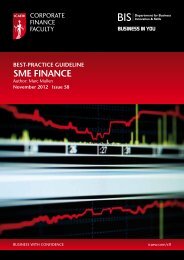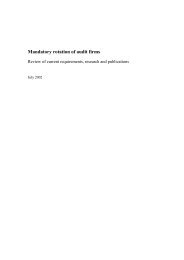4.4 Whe<strong>the</strong>r <strong>the</strong> remit is wide enough to regard it as a <strong>public</strong><strong>in</strong>terest matterOne of <strong>the</strong> issues <strong>for</strong> <strong>the</strong> advocate of a <strong>public</strong> <strong>in</strong>terest action to consider, particularly <strong>for</strong> anorganisation, is what authority <strong>the</strong>re is and whe<strong>the</strong>r <strong>the</strong> advocate’s remit extends to <strong>the</strong> issue.This especially applies where <strong>the</strong> <strong>in</strong>tent is to apply <strong>the</strong> decision ra<strong>the</strong>r than act as a <strong>for</strong>ce of<strong>in</strong>fluence on o<strong>the</strong>rs. A <strong>public</strong> <strong>in</strong>terest perspective may be mandated by remit and encouragedby structure. This expla<strong>in</strong>s why <strong>the</strong> matter is said to be a <strong>public</strong> <strong>in</strong>terest issue but <strong>the</strong> onus toexpla<strong>in</strong> why <strong>the</strong> particular action is <strong>the</strong> right <strong>public</strong> <strong>in</strong>terest one rema<strong>in</strong>s.Alternatively <strong>the</strong> remit scope may be very narrow (as <strong>in</strong> <strong>the</strong> village example above). In suchcircumstances a <strong>public</strong> <strong>in</strong>terest perspective would seem over-complicated and <strong>in</strong>deed slightlyva<strong>in</strong>glorious.While a remit may pass <strong>the</strong> test of be<strong>in</strong>g sufficient <strong>for</strong> an action to be a <strong>public</strong> <strong>in</strong>terest matter,it does not follow that all matters considered with<strong>in</strong> such a remit will automatically be <strong>public</strong><strong>in</strong>terest matters – see <strong>ICAEW</strong> example <strong>in</strong> Panel 4.1 below.Panel 4.1: <strong>ICAEW</strong> and <strong>public</strong> <strong>in</strong>terest mattersAs noted <strong>in</strong> Panel 2.4, while <strong>ICAEW</strong>’s charters do not mandate it to adopt a <strong>public</strong> <strong>in</strong>terestperspective, <strong>ICAEW</strong> accepts that it should be adopted as part of <strong>the</strong> consideration <strong>for</strong> ourcont<strong>in</strong>u<strong>in</strong>g professional status. This is particularly noticeable <strong>in</strong>: (i) mak<strong>in</strong>g large parts of ourtechnical guidance on <strong>in</strong>terpretation of legal and regulatory matters available to all, free ofcharge; and (ii) representations to governments and o<strong>the</strong>rs on policy matters.However, not all matters addressed by <strong>ICAEW</strong> are <strong>public</strong> <strong>in</strong>terest matters. For example,membership fees are a matter between <strong>ICAEW</strong> and its members. Follow<strong>in</strong>g <strong>the</strong> village analogy<strong>in</strong> Section 4.3, this <strong>in</strong>volves a fixed number of people, who can be communicated with andwho have <strong>the</strong> right to opt out. This is not a <strong>public</strong> <strong>in</strong>terest matter.The IESBA and <strong>ICAEW</strong> codes of ethics, among o<strong>the</strong>rs, discuss <strong>the</strong> concept of ‘<strong>public</strong> <strong>in</strong>terestentities’ (PIEs). Different authorities take different views as to what constitutes a PIE <strong>for</strong> <strong>the</strong>purposes of ethics codes. The IESBA and <strong>ICAEW</strong> codes specifically <strong>in</strong>clude companies witha list<strong>in</strong>g on a recognised stock exchange but o<strong>the</strong>r entities which have a ‘large number andwide range of stakeholders’ 91 can be seen as PIEs at a given po<strong>in</strong>t <strong>in</strong> time – organisations and<strong>in</strong>dividuals can move <strong>in</strong> and out of <strong>the</strong> categories of PIEs and stakeholders. The concept of a PIEexists <strong>in</strong> <strong>the</strong> code <strong>for</strong> a specified purpose (that of decid<strong>in</strong>g which set of auditor <strong>in</strong>dependencerequirements need to be complied with) and it is <strong>the</strong>re<strong>for</strong>e narrower <strong>in</strong> scope than what wemight consider to be an entity <strong>in</strong> which <strong>the</strong>re is a <strong>public</strong> <strong>in</strong>terest. However, <strong>the</strong> rationale isrelated to our argument previously about <strong>the</strong> use of <strong>the</strong> <strong>public</strong> <strong>in</strong>terest concept: a PIE willgenerally have a wider range of stakeholders than can be communicated with directly and<strong>the</strong>re<strong>for</strong>e a set of standards that places a greater emphasis on perception is required.The codes also consider matters that <strong>in</strong>dividuals might address <strong>in</strong> terms of act<strong>in</strong>g <strong>in</strong> <strong>the</strong><strong>public</strong> <strong>in</strong>terest, <strong>in</strong> particular overrid<strong>in</strong>g presumptions of confidentiality where <strong>in</strong>stances of badbehaviour have been discovered or at least suspected. Confidentiality is a fundamental pr<strong>in</strong>cipleas without it, <strong>the</strong>re would be <strong>in</strong>sufficient trust <strong>in</strong> <strong>the</strong> accountant to enable him or her to do<strong>the</strong>ir job. However, where <strong>the</strong> law permits, <strong>the</strong> codes note that <strong>the</strong>re can be circumstanceswhere that pr<strong>in</strong>ciple can be over-ridden to allow disclosure <strong>in</strong> <strong>the</strong> <strong>public</strong> <strong>in</strong>terest.<strong>ICAEW</strong> has supplementary guidance on this issue, not<strong>in</strong>g that (<strong>in</strong> l<strong>in</strong>e with UK legislation)examples of situations where disclosure might be regarded as be<strong>in</strong>g <strong>in</strong> <strong>the</strong> <strong>public</strong> <strong>in</strong>terest<strong>in</strong>clude: a crim<strong>in</strong>al offence; a miscarriage of justice; matters where health and safety areendangered; and damage to <strong>the</strong> environment.In terms of matters to consider when determ<strong>in</strong><strong>in</strong>g whe<strong>the</strong>r or not a disclosure is justified <strong>in</strong> <strong>the</strong><strong>public</strong> <strong>in</strong>terest, examples given <strong>in</strong>clude similar matters to those referred to <strong>in</strong> 4.3.1 above <strong>in</strong> <strong>the</strong>context of breach of professional confidentiality, as well as <strong>the</strong> availability of legal protection <strong>for</strong>breach of duty of confidentiality. Critically though, <strong>the</strong> guidance cautions that each situationneeds to be considered on its own merits. 924.5 Practical limitations on <strong>the</strong> outcome<strong>ICAEW</strong>’s Crisis Without a Legacy programme of policy summits has developed a triangulationdoctr<strong>in</strong>e: recognition that at a practical level, <strong>in</strong>ternational <strong>public</strong> policy decisions need tobalance <strong>the</strong> demands of <strong>in</strong>ternational <strong>public</strong> <strong>in</strong>terest, market <strong>for</strong>ces and popular op<strong>in</strong>ion. 9391<strong>ICAEW</strong>, Code of Ethics.92<strong>ICAEW</strong>, Professional Conduct <strong>in</strong> Relation to Defaults or Unlawful Acts.93For example, <strong>ICAEW</strong>, Crisis Without a Legacy London Policy Summit 21 May 2012.30Applicability of <strong>the</strong> <strong>public</strong> <strong>in</strong>terest
This highlights that <strong>the</strong>re may be political or o<strong>the</strong>r practical reasons why what might be <strong>the</strong>optimum <strong>public</strong> <strong>in</strong>terest outcome cannot be delivered.Where such considerations do affect <strong>the</strong> outcome, long-term reputation is likely to suffer less byacknowledg<strong>in</strong>g that <strong>the</strong>re are practical considerations which have changed <strong>the</strong> outcome, ra<strong>the</strong>rthan contrive an argument that <strong>the</strong> sub-optimal (from a <strong>public</strong> <strong>in</strong>terest perspective) outcome isactually <strong>in</strong> <strong>the</strong> <strong>public</strong> <strong>in</strong>terest.4.6 Use of <strong>the</strong> <strong>framework</strong> <strong>for</strong> non-<strong>public</strong> <strong>in</strong>terest mattersEven if <strong>the</strong> issue is not a <strong>public</strong> <strong>in</strong>terest matter, <strong>the</strong> <strong>framework</strong> may still be useful to an advocateof an action that <strong>in</strong>volves a wider range of people than can be communicated with directly.However, <strong>the</strong> justification used should fit <strong>the</strong> purpose. O<strong>the</strong>r alternatives might <strong>in</strong>clude, <strong>for</strong>example:• acknowledgement that <strong>the</strong> matter is <strong>for</strong> <strong>the</strong> benefit only of a few, but obta<strong>in</strong><strong>in</strong>g agreementfrom those disadvantaged by <strong>in</strong>clud<strong>in</strong>g compensation <strong>in</strong> <strong>the</strong> arrangements; or• arrang<strong>in</strong>g <strong>the</strong> matter as someth<strong>in</strong>g that people can opt <strong>in</strong> to or opt out of.4.7 Chapter summaryThe use of <strong>the</strong> concept of <strong>the</strong> <strong>public</strong> <strong>in</strong>terest as justification will present a challenge. Itshould be used only where it needs to be used and where it can be supported by address<strong>in</strong>gsatisfactorily <strong>the</strong> matters raised <strong>in</strong> this <strong>framework</strong>The <strong>public</strong> <strong>in</strong>terest is an abstract notion; to argue and be able to hold out that an action (or<strong>in</strong>action) is <strong>in</strong> <strong>the</strong> <strong>public</strong> <strong>in</strong>terest can require consideration of a number of complex factorsand it imposes a burden of proof on <strong>the</strong> advocate of <strong>the</strong> action. Flaws <strong>in</strong> <strong>the</strong> argument or <strong>the</strong>outcome can rebound upon <strong>the</strong> reputation of <strong>the</strong> advocate, which will harm acceptance offuture matters asserted to be <strong>in</strong> <strong>the</strong> <strong>public</strong> <strong>in</strong>terest. Alternative means of justification may bepreferable, where much of <strong>the</strong> <strong>public</strong> is scoped out, or can opt out.Matters to consider when decid<strong>in</strong>g whe<strong>the</strong>r to use a <strong>public</strong> <strong>in</strong>terest justification <strong>in</strong>clude:• <strong>the</strong> purpose of seek<strong>in</strong>g to <strong>in</strong>voke <strong>the</strong> <strong>public</strong> <strong>in</strong>terest;• whe<strong>the</strong>r <strong>the</strong> matter is really <strong>in</strong>tended to be <strong>for</strong> <strong>the</strong> benefit of society, as represented by <strong>the</strong>relevant <strong>public</strong> – this will <strong>in</strong>volve a wide section of <strong>the</strong> <strong>public</strong>, whe<strong>the</strong>r <strong>the</strong>y like it or not;• whe<strong>the</strong>r <strong>the</strong> locus or remit of <strong>the</strong> advocate of <strong>the</strong> action permits or requires a <strong>public</strong><strong>in</strong>terest perspective; and• whe<strong>the</strong>r political or o<strong>the</strong>r practical considerations are likely to result <strong>in</strong> a sub-optimaloutcome <strong>for</strong>m a <strong>public</strong> <strong>in</strong>terest perspective.Even if <strong>the</strong> issue is not a <strong>public</strong> <strong>in</strong>terest matter, <strong>the</strong> <strong>framework</strong> may still be useful to thoseadvocat<strong>in</strong>g an action that impacts upon a fairly wide group of people, but <strong>the</strong> justification usedshould fit <strong>the</strong> purpose.It is important to consider whe<strong>the</strong>r <strong>the</strong> likely debate would be about what is <strong>in</strong> <strong>the</strong> <strong>public</strong><strong>in</strong>terest: it may <strong>in</strong>stead be about different expectations of what is likely to happen <strong>in</strong> <strong>the</strong> future.Applicability of <strong>the</strong> <strong>public</strong> <strong>in</strong>terest31
- Page 1 and 2: ACTING IN THE PUBLIC INTEREST:A FRA
- Page 3: ACTING IN THE PUBLIC INTEREST:A FRA
- Page 9: Our framework is based around the k
- Page 12 and 13: The answers to these questions will
- Page 14 and 15: 2. INTRODUCTION2.1 Concepts of the
- Page 16 and 17: Accordingly, this report addresses
- Page 18 and 19: Panel 2.4: ICAEW and its public int
- Page 20 and 21: The Mediterranean republics needed
- Page 22 and 23: We set out a framework for discussi
- Page 24 and 25: 3. CREDENTIALS FOR INVOKINGTHE PUBL
- Page 26 and 27: By and large producers operate in s
- Page 29 and 30: the UK government set up a ‘Commi
- Page 31 and 32: 4. APPLICABILITY OF THE PUBLIC INTE
- Page 33: to be a public interest matter: fir
- Page 38 and 39: 5. THE RELEVANT PUBLIC5.1 ScopeIn o
- Page 40 and 41: 5.3 Geographical exclusionsGeograph
- Page 42 and 43: 6. THE RELEVANT PUBLIC’S WANTS6.1
- Page 44 and 45: • work, that is having some, havi
- Page 46 and 47: Panel 6.3: Weisbrod’s public inte
- Page 48 and 49: Having sought out representative op
- Page 50 and 51: 7. CONSTRAINTS TO WANTS7.1 Self-int
- Page 52 and 53: In terms of whether the relevant pu
- Page 54 and 55: Panel 7.5: Management of national d
- Page 56 and 57: Panel 7.6: ICAEW and clarity of val
- Page 58 and 59: 8. AGGREGATION AND DECISION8.1 Base
- Page 60 and 61: Other ethical decision-making model
- Page 62 and 63: In this instance, while national se
- Page 65 and 66: 9. IMPLEMENTATIONA proposed action
- Page 67 and 68: • giving up where targets seem un
- Page 69 and 70: 9.2.1 Government authorityAt the st
- Page 71 and 72: 9.3 Infrastructure and support tool
- Page 73 and 74: 12. The framework proposes a signif
- Page 75 and 76: ibliographyAdler, Jonathan H, Perve
- Page 77 and 78: Goldstein, Eric A, ‘Defining the
- Page 79 and 80: Persky, Joseph, ‘Retrospectives:
- Page 81: The ICAEW is a founder member of th



